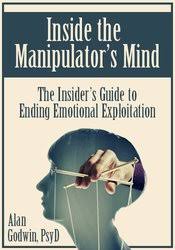Inside the Manipulator’s Mind: The Insider’s Guide to Ending Emotional Exploitation – Alan Godwin
$200.00 Original price was: $200.00.$56.00Current price is: $56.00.
Proof of item:
Constructive Strategies for Countering Emotional Manipulation
From guilt trips to gaslighting, emotional manipulation takes many forms, and it’s often so covert that clients have difficulty articulating how and when it’s happening.
This recording explores the manipulator’s motivations for relating to others through drama, offering an in–depth analysis of the manipulation process. Discover effective strategies your clients can use immediately to recognize and counter manipulation in any setting while establishing healthy relational boundaries. Combining decades of clinical practice and the latest behavioral research, Dr. Alan Godwin offers comprehensive solutions you will be ready to use the next day to engage and empower your clients.
- Describe the manipulation process and examine common manipulative behaviors in clients
- Analyze the relationship between reasoning deficiencies and emotionally manipulative behavior in clients
- Articulate behavioral patterns characteristic of people who tend to be most susceptible to emotional manipulation
- Explain common responses to and risks of emotionally manipulative behavior
- Evaluate strategies clients can use to effectively counter manipulation in a variety of contexts
- Identify common limitations of manipulative relationships and relate to treatment outcomes
Get Inside the Manipulator’s Mind: The Insider’s Guide to Ending Emotional Exploitation of author Alan Godwin
The Manipulator’s Mind
- Defining emotional manipulation
- Five reasoning deficiencies at the heart of emotional manipulation
- Humility
- Awareness
- Responsibility
- Empathy
- Reliability
- Drama, schemata, and overcompensation
- The master
- The martyr
- The messiah
- Methodologies of
- Grooming
- Manipulation
- Maintaining the toxic status quo
- Elements of manipulation associated with disordered and non-disordered individuals
- Behavioral variations according to context (business, family, romance)
- Short- and long-term psychological damage
- When attempts to manipulate don’t succeed
Manipulative Relationship Dynamics
- Healthy vs. manipulative relationships
- Characteristics of attraction, dependency, and role participation
- Codependency and addiction
- Commonly-exploited vulnerabilities
- Naïve expectations
- Unwarranted benefit of the doubt
- Attempting to reason with the unreasonable
- Who stays, who leaves, and why?
Countering Manipulation & Ending Destructive Cycles
- Discern the report’s accuracy
- Teach counterintuitive behavior
- Outline and recognize the manipulation process
- Understand the antagonist
- Disarm buttons
- Respond vs. react
- Set boundaries
- Lean on connections
- Acknowledge relational limitations
- Identify risk factors
- Minimize fallout
- Measure recovery
- Strategies for overcoming resistance to change
- Resources for ongoing support
EXAMPLES & APPLICATIONS
- Example #1: Set up to fail in the workplace
- Example #2: Love under lock and key
- Example #3: The guilt-tripping parent
- Example #4: The God’s-gift-to-the-world relative
Get Inside the Manipulator’s Mind: The Insider’s Guide to Ending Emotional Exploitation of author Alan Godwin
1 review for Inside the Manipulator’s Mind: The Insider’s Guide to Ending Emotional Exploitation – Alan Godwin
| 5 star | 100 | 100% |
| 4 star | 0% | |
| 3 star | 0% | |
| 2 star | 0% | |
| 1 star | 0% |
Sorry, no reviews match your current selections
Q & A
Related products
Personal Development
Jess Lively – Magic Flow School – The Ultimate Course Bundle
Personal Development
Personal Development
Personal Development
Personal Development
Reuben Brooks – The Ultimate Transformation – Meal Plan & Training Program
Personal Development
Personal Development
Personal Development














Absolutely no complaints. Fast, easy transaction. Thanks! | Inside the Manipulator’s Mind: The Insider’s Guide to Ending Emotional Exploitation – Alan Godwin